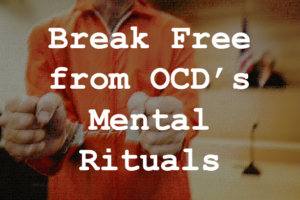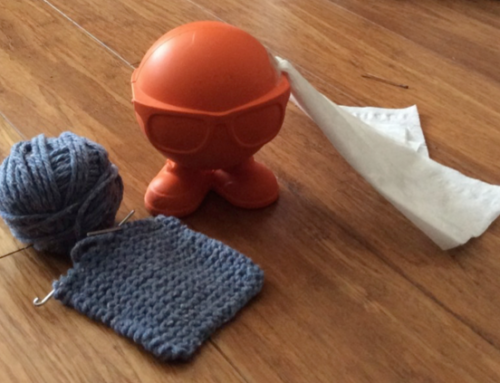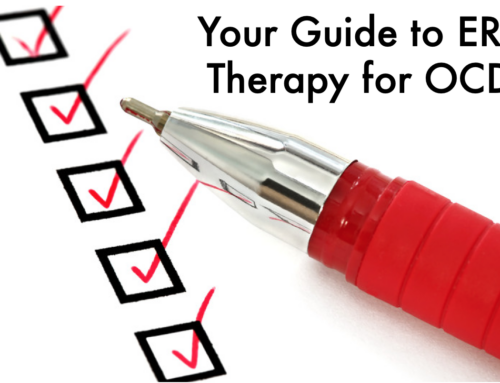One of my favorite pieces of advice in Reid Wilson’s Afterword to Fred is “Don’t accept OCD’s invitation to transact. If you never pick up the message to start with, then you don’t have to work to set it down again.”
Reid’s advice is the essence of Shoulders Back and the “Man in the Park” technique I’ve written two posts about (the original and the Q&A). It is, as I describe in those posts, my favorite ERP technique because I’ve found it to be incredibly powerful.
But if you have trouble using Shoulders Back/Man in the Park because you keep transacting with your OCD in your mind, otherwise known as “mentally ritualizing” or what some call “pure-O,” then you’ll probably find this blog post of interest. It’s about an ERP technique that’s a bridge tool to help you develop the strength to do Shoulders Back/Man in the Park effectively.
The courtroom
If there’s one thing I am exceptionally good at, it’s mentally ritualizing. I’ve had OCD since I was about 5 or 6 years old, and part of my OCD’s Rule #1 was that no one could know about the monster in my head. I was not allowed to act like anything was wrong at any time, which means that I did not engage in much avoidance or in many detectable compulsions in all my decades of untreated OCD. Instead, I became skilled at pushing myself into situations my OCD found uncomfortable and then going over those situations in my head repeatedly—for hours, days, sometimes even years—to convince myself that I hadn’t done anything wrong.
Over time, I became exceptionally skilled at the art of mentally ritualizing. I would analyze, replay, recreate, justify, defend, convince—anything to make myself believe that I wasn’t in danger, anything to try to get rid of that anxiety. And I could do all these mental gymnastics while doing anything else: having a conversation, giving a presentation, writing a proposal, seeing a play, anything.
As I look back on what I used to do, it was very much like having a courtroom trial going on in my head. Say, for instance, that my OCD was telling me that when I stopped by my coworker Bill’s cube, I’d told him not how good his idea for the new marketing campaign was, but instead the fleeting thought that had run through my mind during our staff meeting that morning: that he talked too much and took credit for ideas that weren’t his.
Begin the mental courtroom proceedings (and please note, all of the scene you’re about to read could transpire in just a few seconds in my head):
How do you plead?
My attorney: Your honor, we’re here today to prove beyond a shadow of a doubt that my client, Shala Nicely, not only didn’t say those words to Bill, but she didn’t even think them, because to think such things would be horrendous, and my client is a good person.
Judge: Ms. Nicely, how do you plead?
Me: Not guilty, your honor.
Prosecutor, staring at me like I’m filth: How can you even say you didn’t have the thought? You’re thinking the thought right now! And I know that you said the words out loud, because didn’t you see the way Bill looked at you as you were leaving? Like he was crushed!
Prosecutor’s second chair, jumping up from her seat: Not only that! I saw Bill talking to Amy later, and they both looked at the accused as if she were a vile human being, which clearly means that Bill told Amy what Ms. Nicely said, and they were processing how horrible she really is.
My attorney: Objection! There is no evidence that’s what they were talking about. They could have been talking about anything!
Juror, meekly holding his hand up, looking at the prosecutor: Excuse me, but speaking of evidence, you mentioned in your opening argument that the accused has had other charges brought against her for having a horrible character, such as how she might have offended the VP last week in that meeting where she interrupted him.
Me: No, I didn’t interrupt him! And he likes me. He told me what a good job I did on that new campaign only this morning!
Judge, banging gavel: Order! Bailiff, I will ask you to remove the accused if she can’t restrain herself during these proceedings!
My attorney: This is all nonsense! My client is a good, decent human who never means to hurt anyone. No one could possibly hold this one little transgression against her, even if it really did happen, which I’m 97.3% sure it didn’t.
Prosecutor: Intentions don’t matter. Actions matter. And I’m 98.7% sure that she said out loud that Bill was a credit-stealing loudmouth. Can you believe it? Who says that kind of thing?!?!
……And on and on and on. The trial in my head would never adjourn, no matter what I was doing. There would only be occasional breaks to switch out the players for fresh lawyers, a new judge and jury whenever my OCD sensed I’d committed yet another felonious act that needed deliberation.
This never-ending courtroom in my head proved problematic when I started doing exposure therapy for OCD. Even though I worked diligently on stopping all my secretive physical rituals as I exposed myself to various obsessions, the courtroom drama would often continue, unabated. Which meant that in essence I was doing exposure and partial response prevention, since I was still doing mental rituals. Which also meant that my ERP exercises weren’t as effective as they could have been.
“May or may not”
As I discuss in Is Fred in the Refrigerator? Taming OCD and Reclaiming My Life, I decided to do most of my exposure therapy on my own, so without the guidance of a weekly therapist, it took me a long time to figure out I was sabotaging myself by letting my head hold court. And once I’d identified this was an issue, I just couldn’t seem to stop the proceedings. I seemed to be stuck in the courtroom not only listening, but participating! My mental courtroom drama been going on for decades after all; it was what my mind was used to doing.
But eventually I decided just because I was stuck in the courtroom, it didn’t mean I had to listen to what was being said or participate in the proceedings.
This is where I came up with my “may or may not” statements, also known as “scripts” or “scripting.” When I did ERP, or when I just got triggered, I listened to the proceedings for a handful of seconds to hear what my OCD thought the charges against me were, and then I started saying “may or may not (MOMN)” statements out loud, aggressively and quickly. For instance:
“I MOMN have told Bill he was a credit stealing loud mouth. I MOMN be a horrible person. I MOMN have interrupted Steve in our meeting. Steve MOMN be lying to me when he said I did a good job on the campaign. Bill MOMN have told everyone that I said rude things to him. Everyone MOMN hate me. I MOMN lose my job and never be able to get another. I MOMN have ruined my career because of this one transgression, which MOMN have even happened. But I can handle being anxious and uncertain, and in fact, I want that, because that’s how I beat you OCD.”
Why scripting can be helpful
These scripts served two purposes:
- Competing response: If I said them out loud, talking quickly with almost no space between words, then I could not hear or participate in the courtroom drama in my head. I would only stop scripting occasionally for a few seconds to listen to the trial to make sure my MOMN statements weren’t leaving anything out that my OCD was worried about. (Essentially, I was just making sure I was taking all the obsessions currently in my head into account). The scripts acted as a competing response to my mental rituals. If I was scripting out loud, it was almost impossible to hear or give “testimony” in the courtroom.
- Be present with obsessions without ritualizing: They forced my OCD to be present with the obsession in a therapeutic (as opposed to compulsive) way and face the uncertainty of the situation, that maybe I did do whatever it thought I did and maybe I didn’t. That I would, in fact, never know. That OCD’s questions are, as always, unanswerable.
It would sometimes take 5 minutes, 15 minutes, 45+ minutes, sometimes even hours, before I could stop scripting and not hear the courtroom proceedings. My scripts generally resulted in a mistrial, because all sides would realize that there was no definitive evidence, that this was all about uncertainty and all parties were just going to have to live with that. Recognizing that I wasn’t participating anymore and that we were never going to find “the answer,” the judge, lawyers and jurors just packed up and went home.
Although scripting does have some shortcomings…
While there’s nothing wrong with scripting, as a tool it does have some shortcomings:
- It often takes a long time to work. Like I mentioned above, I would often say my scripts out loud for the length of the nightly news before I could move on. That’s pretty time-consuming and exhausting.
- Scripting does give some credence to OCD’s “content,” all the stuff it uses to scare you. You are, in fact, transacting with it, but you’re doing so in a way that’s not compulsive. With scripting, you are paying attention to OCD’s content in that you are listening to the stories OCD is spinning in order to repackage them as MOMN statements and them hurl them back at the OCD. But you are wallowing in content, and OCD is NOT about the content. It’s about the uncertainty of not knowing whether that or any content OCD throws at you is true.
However, for those of us who are mental ritualizers and who can’t figure out how to leave the courtroom, I would argue that doing scripting is an incredibly mindful way to deal with the situation. For us, what’s real in the present moment are those obsessions that the court is deliberating about. To do ERP effectively, we need to be present with those obsessions without engaging with them ritualistically, and scripting allows us to do that.
Remember: this is about general uncertainty
Also, sometimes scripting about particular types of content is really tough. “I MOMN be a pedophile” is one example. But the truth is, we ALL may or may not be pedophiles or murderers or about to lose our minds or have an undiagnosed disease that will eventually kill us. We just don’t spend any time thinking about any of that if we don’t have OCD about those topics. So if I find myself unable to leave a mental courtroom about topics like these, I’ll say, “I MOMN be a pedophile, just like everyone may or may not be. This is about general uncertainty, and I’m going to accept this uncertainty just like I accept all uncertainty.” Or, sometimes I will insert random, ridiculous uncertainties to one up and poke fun at the OCD and remind myself this is about general uncertainty, which I’m really good at handling: “Yes, OCD, I MOMN be a pedophile. My mom might be one, too. I might come from a family of them. And an asteroid MOMN fall through the ceiling at any moment. I’m working on accepting all of this uncertainty.” Because really, when’s the last time you worried about space junk hitting your house?
You are good at handling uncertainty, and we want worrying about being a child molester to fall into the same category as worries about meteors falling on your head.
I did scripting for several years before I finally developed Shoulders Back, and it was an important bridge tool for me that allowed me to identify the difference between obsessions (the “what if?” questions) and mental compulsions (trying to figure out the answer to those unanswerable “what ifs”). Saying scripts also gave me practice in directing my attention away from the courtroom drama and onto something else (my scripts), helping me develop the mental muscles to redirect away from compulsive mental activity and to use Shoulders Back effectively.
While I don’t use scripting much anymore, I found it quite helpful in the early part of my recovery and find it helpful today whenever I get conned into participating in the occasional courtroom drama in my head. But to the best of my ability, whenever I see that courtroom deliberations are about to begin, I try to use the most powerful of all my tools: I put my shoulders back, act as if I’m not on trial, and get up and leave the courtroom.
Questions?
 I answered questions from readers in the follow-up Q&A blog about using scripting. You can also see my book, Is Fred in the Refrigerator? Taming OCD and Reclaiming My Life, for more about how I used MOMN as part of my OCD recovery.
I answered questions from readers in the follow-up Q&A blog about using scripting. You can also see my book, Is Fred in the Refrigerator? Taming OCD and Reclaiming My Life, for more about how I used MOMN as part of my OCD recovery.
If you’d like to receive notifications of new blog posts, sign up for my Shoulders Back! newsletter, and I’ll send you OCD-taming tips & resources every month.
My blogs are not a replacement for therapy, and I encourage all readers to find a competent ERP therapist. See the IOCDF treatment provider database for a provider near you.











[…] reinforcement. Just like every time I react to OCD as if it’s meaningful by doing a physical or mental compulsion, I get a little hit of anxiety relief. With either picking up the phone or doing a compulsion, […]